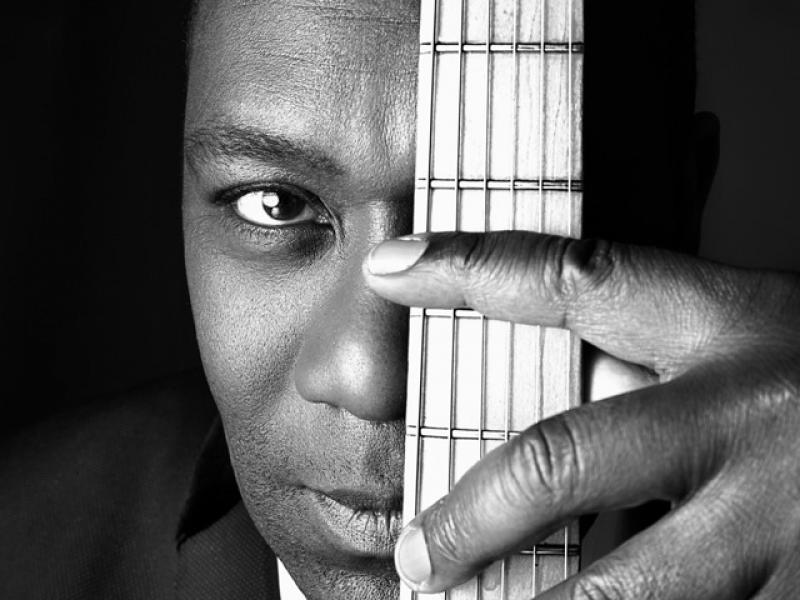Lenny Henry, Touring | reviews, news & interviews
Lenny Henry, Touring
Lenny Henry, Touring
Anecdotes aplenty and kicking live music in his autobiographical show

It takes a certain something to make a roomful of white people get their funk on.
Henry’s ethnicity plays a big part in Cradle to Rave: A Musical Journey, as well, of course, his musical tastes; the Jamaican music of his childhood, the white-boy soul of his youth, the banging club beats of his twenties, through to today’s hardcore rap. There's the occasional very funny sideswipe at musicians he feels don't cut the mustard, Jamiroquai and Elton John, for example, and as he tells his anecdotes excerpts from his vast music catalogue - he has a whopping 28 days’ worth on his iPod - are played. Judging by his fans’ murmurs of recognition, many of those tracks are on theirs too.
The lad from Dudley has deservedly turned into a national institution
As Henry comes on in his sparkly suit, the evening starts as almost traditional stand-up and his stories are wonderfully evocative. We learn of the rent parties of his childhood (when money was tight families in his street would throw a party with an entrance fee), when the front room was cleared and DJ decks hauled in, and goat curry and rice was cooking in the kitchen; this was where the eight-year-old Lenny got his first taste of alcohol. He then describes the clubs he went as a teenager, desperate to lose his virginity, and the club in Wolverhampton where he first performed before an audience that didn’t consist of his classmates, for whom he would clown around.
Much of this Henry has covered in previous tours and on chat shows, but what I didn’t know was how desperate he was to become a professional musician and how poverty (he is one of seven siblings) prevented childhood piano lessons - although he now proudly displays his hard-won Grade 3 status on the onstage piano. He even cut a couple of albums back in the mid-1980s and had a meeting with Trevor Horn, “the Simon Cowell of his day”, but realised that although he was passionate about listening to music, he wasn’t so passionate about making it, and so comedy won.
Henry was the television soundtrack for those of a certain age, who laugh fondly at the memories he evokes of their childhood, whether it was his New Faces win, or his Tiswas years, or his impressions, a couple of which he gives an airing to here. He is now an award-winning actor, of course, and one of the funnier anecdotes concerns listening to rap music while backstage at Othello in London's West End - “Killed my ho' / with a pillow” - and missing an entrance.
Some of the jokes are a bit obvious and a couple of the anecdotes need to be shorter. And I would have liked more exploration of the darker moments of Henry’s life; he mentions in passing, as if it were funny, the beatings his mother dished out, his father’s lack of interest in his children and his marriage, now ended. Surely he made a break-up mix? There’s a lot more to the comic than he is prepared to allow his fans to know.
But there’s no denying the affection in which Henry is held and when a kicking three-piece band comes on to perform a funk-filled encore with the comic belting out the numbers, and which turns into a mass singalong, you realise that the lad from Dudley has deservedly turned into a national institution.
Explore topics
Share this article
Add comment
more Comedy
 Spencer Jones: Making Friends, Soho Theatre review - award-winning comedian mines his post-lockdown escape to the country
If big chickens scare you, this is your thing!
Spencer Jones: Making Friends, Soho Theatre review - award-winning comedian mines his post-lockdown escape to the country
If big chickens scare you, this is your thing!
 Six Chick Flicks, Leicester Square Theatre review - funny, frenetic and feminist spoof
Whip-smart parody of the genre
Six Chick Flicks, Leicester Square Theatre review - funny, frenetic and feminist spoof
Whip-smart parody of the genre
 Catherine Bohart, Soho Theatre review - girlfriends, gossip and gay parenthood
Full-throttle show from Irish comic
Catherine Bohart, Soho Theatre review - girlfriends, gossip and gay parenthood
Full-throttle show from Irish comic
 Miles Jupp, Cambridge Arts Theatre review - life's vicissitudes turned into laughs
Finding the funny in medical emergency
Miles Jupp, Cambridge Arts Theatre review - life's vicissitudes turned into laughs
Finding the funny in medical emergency
 Andy Parsons, Touring review - reasons to be cheerful...
...Even if the country's falling apart
Andy Parsons, Touring review - reasons to be cheerful...
...Even if the country's falling apart
 Paul Foot, Soho Theatre review - how to discover the meaning of life
Personal show from the absurdist comic
Paul Foot, Soho Theatre review - how to discover the meaning of life
Personal show from the absurdist comic
 Fascinating Aida, London Palladium review - celebrating 40 glorious years of filth and defiance
Age has not withered one jot the FAs' fury at the absurdities of modern life
Fascinating Aida, London Palladium review - celebrating 40 glorious years of filth and defiance
Age has not withered one jot the FAs' fury at the absurdities of modern life
 Frank Skinner: 30 Years of Dirt, Gielgud Theatre review - a mature master of class-A smut
Has Skinner's act got less dirty over the years, or audiences more so?
Frank Skinner: 30 Years of Dirt, Gielgud Theatre review - a mature master of class-A smut
Has Skinner's act got less dirty over the years, or audiences more so?
 Tatty Macleod, Soho Theatre review - cross-Channel relations
Entertaining debut from TikTok star who grew up England and France
Tatty Macleod, Soho Theatre review - cross-Channel relations
Entertaining debut from TikTok star who grew up England and France

Comments
...